
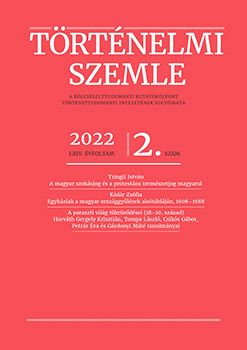
STUDIES
István Tringli: Hungarian Customary Law and Protestant Natural Law in Hungarian 173
Zsófia Kádár: Churchmen on the Lower Table of the Hungarian Diet, 1608–1688 203
REFLECTIONS OF THE PEASANT WORLD
Gergely Krisztián Horváth: The Execution of the Hungarian Abolition of Peasant Serfdom and its Historiographical Perceptions 251
László Tompa: From Smallholders to Giant Estates. Contract Tenant Peasantry in the Counties of Veszprém, Sopron, Borsod and Bihar 269
Gábor Csikós: ”… more fools have to be produced for the state”. The Physiological Limits of Stalinist Social Engineering, 1952 295
Éva Petrás: The Social Question in Changing Perspectives. The Agrarian Social Political Concept of Jenő Czettler 315
Máté Gárdonyi: ”The Countryside is our Playground”. Ecclesiastico-political Struggles, Catholic Social Organisation and the Problems of Provincial Hungary in the late Nineteenth Century 327
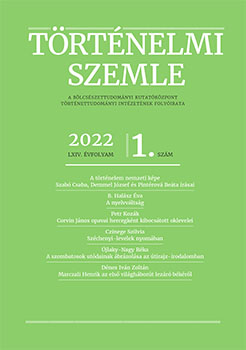
NATIONAL IDEA OF HISTORY
Csaba Szabó The Myth of Eternal Dacia. The Metahistory of Dacian-Romanian Continuity in Contemporary Romanian Archaeology and Historiography 5
József Demmel “Botond the Oláh-Beater” in Switzerland of the East. László Réthy and the Curious History of National Minorities in Post-1867 Hungary 21
Beáta Pintérová “Early Slovak History” in Recent Slovak Scholarly Literature 41
STUDIES
Éva B. Halász The Fine of the Tongue 55
Petr Kozak The Charters of John Corvinus in Czech Archives 69
Szilvia Czinege On the Trace of Széchenyi Letters 121
Réka Újlaki-Nagy The Representation of the “Székely Jerusalem” and the Successors of Sabbatarians in the Travel Literature of the Late 19th and Early 20th Centuries 137
Zoltán Dénes Iván Defender of the “Victims”, Prosecutor of the “Persecutores”? Henrik Marczali on the Peace that Closed World War I 155
DEBATE
Ákos Bartha Inset, pricing 169
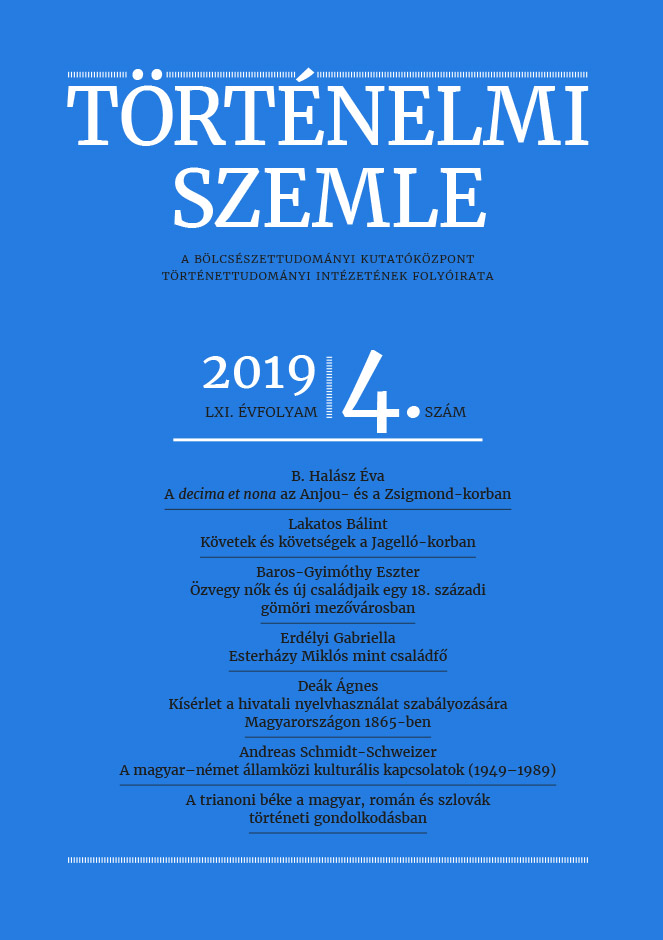 STUDIES
STUDIES
Éva Halász The decima et nona in the era of Anjou and Sigismund 571
Bálint Lakatos The Diplomats of the Hungarian–Bohemian King. Royal Envoys and Missions in the Jagiellonian period, 1490–1526. Part I. Preliminary Research Report 593
Gábor Mikó The Formulary of Miklós Oláh Miklós. Introductory Study to a Critical Edition in Preparation 617
Eszter Márta Baros-Gyimóthy Widowed Women and their New Families in an Eighteenth-Century Market Town in Gömör County 633
Gabriella Erdélyi Miklós Esterházy as Paterfamilias. Succession and Emotions in a Seventeenth-Century Aristocratic Dynasty and Stepfamily 657
Ágnes Deák An Attempt to Regulate Official Language Use in Hungary in 1865 681
Andreas Schmidt-Schweizer In the Buffer Zone of the Cold War and the German Question. Cultural Relations between the Peoples’s Republic of Hungary and the Two German States (1949–1989) 703
Csaba Zahorán ”Peace will Last as Long as the Neighbour Wants It.” Trianon and the Relationship of Hungary to her Neighbours in Our Day 731
Marius Diaconescu ”Complete National Liberty” in the Declaration of Alba Iulia of 1 December 1918 745
Ondrej Ficeri To Take the Responsibility for Trianon 763
Gergely Romsics – Csaba Zahorán Pioneering Historians. Remarks on the Margin of an Unfinished Dispute 777
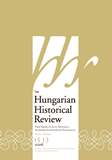 The latest thematic issue of The Hungarian Historical Review is entitled Saints Abroad. Its contents are available here. The periodical can be purchased or ordered at the HAS RCH Institute of History (MTA BTK Történettudományi Intézet, Budapest 1014, Úri u. 53. I. em. 57.; Phone: +36 1 224-6700/626. Mail: ) and at HAS RCH Penna Bookstore of Humanities (MTA BTK Penna Bölcsész Könyvesbolt, 1053 Budapest, Magyar utca 40., Phone: +36 30 203 1769, Mail: ). Single issue EUR 20, postage excluded; annual subscription for 2017: EUR 60 (EUR 75 for institutions), postage excluded. More information at www.hunghist.org.
The latest thematic issue of The Hungarian Historical Review is entitled Saints Abroad. Its contents are available here. The periodical can be purchased or ordered at the HAS RCH Institute of History (MTA BTK Történettudományi Intézet, Budapest 1014, Úri u. 53. I. em. 57.; Phone: +36 1 224-6700/626. Mail: ) and at HAS RCH Penna Bookstore of Humanities (MTA BTK Penna Bölcsész Könyvesbolt, 1053 Budapest, Magyar utca 40., Phone: +36 30 203 1769, Mail: ). Single issue EUR 20, postage excluded; annual subscription for 2017: EUR 60 (EUR 75 for institutions), postage excluded. More information at www.hunghist.org.
 The first issue of World History (Világtörténet) for 2016, a thematic issue dedicated to Saint Martin of Tours) has been published. The present volume, edited by Marianne Sághy, contains multidisciplinary studies which reflect the new directions of the Martin-research on the occasion of the 1700th anniversary of the Saint’s birth at Savaria (modern Szombathely in Hungary). Attention is mainly focused on the hagiographical work of Sulpicius Severus, its late antique socio-religious background, and the examination of the early expansion (fourth to tenth centuries) of the cult, for these aspects have received little scholarly treatment in Hungarian so far. The impresarios of Saint Martin’s international cult were bishops, poets, kings, nuns, emperors and monks: each of them was attracted by a different element in the multifaceted personality of Martin, and the feature emphasised most varied from period to period, and from soldier to bishop, mystic to missionary. Saint Martin has remained the symbol of apostolic poverty and first monasticism for later Christian generations. It is hoped that these studies will not only contribute to a better understanding of the portrayal and cult of Saint Martin, but also give new momentum to Hungarian research of late antique hagiography.
The first issue of World History (Világtörténet) for 2016, a thematic issue dedicated to Saint Martin of Tours) has been published. The present volume, edited by Marianne Sághy, contains multidisciplinary studies which reflect the new directions of the Martin-research on the occasion of the 1700th anniversary of the Saint’s birth at Savaria (modern Szombathely in Hungary). Attention is mainly focused on the hagiographical work of Sulpicius Severus, its late antique socio-religious background, and the examination of the early expansion (fourth to tenth centuries) of the cult, for these aspects have received little scholarly treatment in Hungarian so far. The impresarios of Saint Martin’s international cult were bishops, poets, kings, nuns, emperors and monks: each of them was attracted by a different element in the multifaceted personality of Martin, and the feature emphasised most varied from period to period, and from soldier to bishop, mystic to missionary. Saint Martin has remained the symbol of apostolic poverty and first monasticism for later Christian generations. It is hoped that these studies will not only contribute to a better understanding of the portrayal and cult of Saint Martin, but also give new momentum to Hungarian research of late antique hagiography.
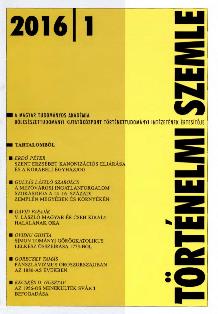 The first issue of Historical Review for 2016 has been published.
The first issue of Historical Review for 2016 has been published.
Péter Erdő’s study aimed at exploring the possible divergences and defects of the process with regard to the contemporary state of the canonization process. It was seeking answer to the question whether the process itself, in terms of its whole course and final result, was in keeping with contemporary prescriptions. László Szabolcs Gulyás’ essay explores the content of the customary law and its practical application in the market towns of northeastern Hungary in the late middle ages. The purchase, exchange, mortgage, alienation and bequest of real estate, as well as their offer to ecclesiastical institutions as pious donation was a general phenomenon in late medieval Hungarian market towns. Free disposition of various pieces of property – plots, houses, arable, mills, pasture, and before all vineyards – was an everyday and widely accepted occurrence. Supervision of real estate trade was a basic duty of the town council, a task it discharged on the basis of the town’s own customary law. Tamás Goreczky’s paper is primarily concerned with the internal and foreign affairs of Russia in the 1880s with a particular focus on one of the influential political phenomena of the decade, Pan-Slavism. The paper provides an overview of the Pan-Slavic movement and its politicians in the aforementioned time span, predominantly based on the reports of István Burián, the Austro-Hungarian consul general in Moscow. Gusztáv D. Kecskés’ study summarises what the Swiss authorities did in order to secure the reception of the refugees, the ways in which the local society reacted to the crisis, and the results that were yielded by the efforts. The conclusion of the author is that while the Swiss response perfectly fits into the general policies of the West, some local characteristics can also be grasped. He regards as the chief feature of success Cold War opposition and the determined governmental will which derived therefrom.
The Great War’s Interpretations in Regional Approach (László Szarka) 165
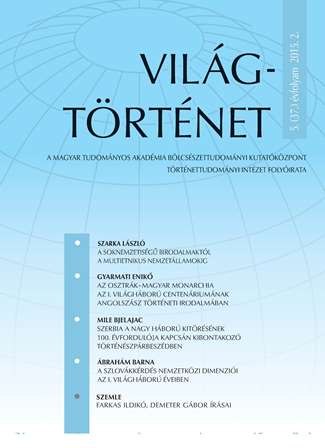 Studies
Studies
László Szarka: From Multi-national Empires to Multi-ethnic Nation States: State-Building Nationalism in East-Central European Countries during the First World War 171
Enikő Gyarmati: Austria–Hungary in the First World War – in the Recent English Language Scholarly Literature 193
Mile Bjelajac: The Role of Serbia in the Current Historical Debates on the Origins of the First World War 217
Ágnes Ózer: Nothing New in Serbia: The Assessment of the First World War and the Reception of the Newest Foreign Literature in Serbia 241
Barna Ábrahám: The International Dimension of the Slovak Question during the First World War 257
László Kürti: Identity and Propaganda in the Art of Miltiades Manno at the Time of the First World War 289
Gabriela Dudeková: Family and Survival Strategies during the First World War: Long-term Changes in the Slovak Society 311
Book Reviews
Kokugaku in Meiji-period Japan: The Emergence of the Modern Japanese National Consciousness (Ildikó Farkas) 333
The Image of Balkan Wars in the Recent French Literature (Gábor Demeter) 338
The Role of the Albanian Storm Centre in the Outbreak of the First World War (Gábor Demeter) 341
Medieval Diplomacy and the Holy See (Renáta Skorka) 1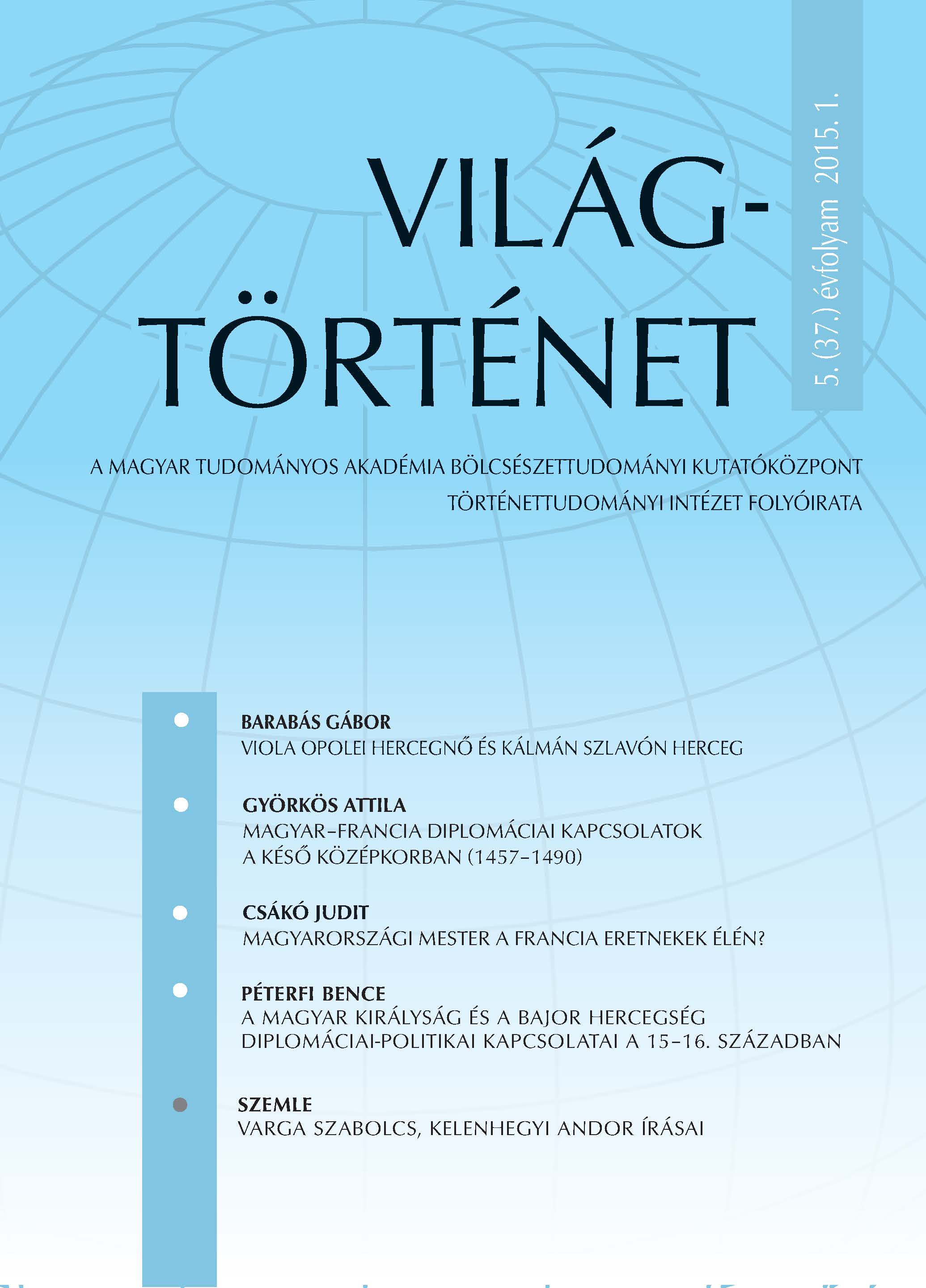
Studies
Gábor Barabás: Duchess Viola of Opole and Coloman, Duke of Slavonia. Contribution to a Historiographical Dispute 5
Ágnes Maléth: Some Remarks on the Itinerary of Cardinal Gui de Boulogne in Hungary 29
Dorottya Uhrin: The Dog-headed, Cow-footed Men. Mongolian Words in the Historia Tartarorum 43
Attila Györkös: “After long and mature deliberation, he accepted the alliance.” Franco–Hungarian Diplomatic Relations in the Late Middle Ages (1457–1490) 61
Judit Csákó: A Hungarian Master at the Head of the French Heretics? Some Remarks on the Narrative Sources of the Movement of the Pastoureaux in 1251 79
Workshop
Bence Péterfi : Diplomatic and Political Relations between the Kingdom of Hungary and the Duchy Bavaria in the 15th and 16th Centuries 113
Echo
Pál Lővei: King Sigismund in Konstanz, 2014 145
Book Reviews
Old “Egregii” (Szabolcs Varga) 153
Converting to the Context (Andor Kelenhegyi) 157
Estates and Defence in Croatia and Slavonia in the 16th Century (Szabolcs Varga) 160
Page 3 of 14